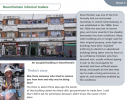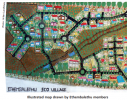Land Library
Welcome to the Land Portal Library. Explore our vast collection of open-access resources (over 74,000) including reports, journal articles, research papers, peer-reviewed publications, legal documents, videos and much more.
/ library resources
Showing items 37 through 45 of 49.The handbook introduces key economic and related concepts explaining the functioning of urban land markets. By introducing key classical economic concepts, the handbook provides foundational economic terms that are often referred to in relation to urban land markets.
This document, written by Josette Cole of the Mandlovu Development Trust, explores the intended and unintended consequences of home ownership for poor citizens living in formal settlements in post-apartheid South Africa. It focuses on New Crossroads in Cape Town, a relatively small, urban co
These documents summarise Urban LandMark's approach to incrementally securing tenure in informal settlements. This approach emphasises practical mechanisms that allow land rights to be upgraded over time.
Recognising that the Managed Land Settlement (MLS) approach is not new to the South African housing and service delivery environment, the purpose of this report is to explore the lessons that can be learnt from programmes and projects which have adopted an MLS-like approach to greenfields develop
This case study draws on research that investigated how urban land is claimed, used or divided and the various land use management (LUM) practices that exist around these various and sometimes competing land uses.
This case study draws on research that sought to understand the process of urban land development in practice, from the perspectives of developers and municipalities.
This case study is based on research undertaken into the experiences of a poor community in accessing land through formal channels in peri-urban South Africa. The research was conducted by a team of researchers pulled together by the World Bank.
This case study draws on research that investigated how people access, trade and hold land in poorer and less formal parts of three metropolitan areas.
This case study examines specific examples of localised and informal land registration practices in South Africa.






